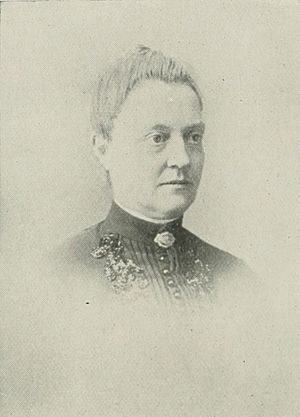Ellen Alida Rose facts for kids
Ellen Alida Rose (born June 17, 1843) was an American woman who worked on farms and fought for women's right to vote. She was a very active member of the Grange, a group for farmers. Thanks to her hard work and other members of the National Grange, a special law was passed to stop unfair gambling on food prices. She was also a key member of the Patrons of Industry. Through her talks and writings, she taught farmers about important changes needed at the time. One of these changes was helping women gain more rights, which she always cared about deeply. Rose was also active in the National Woman Suffrage Association. In 1888, she became a District President for this organization.
Contents
Early Life and Education
Ellen Alida Rudd was born in Champion, New York, on June 17, 1843. She was the youngest daughter of John C. and Lumeda Fowler Rudd. Her family came from England. She went to a local school in her area. She also spent a few terms studying at a village academy.
A Life on the Farm
On December 5, 1861, Ellen married Alfred Rose. In 1862, they moved to Wisconsin. There, she spent her life working on a farm near Brodhead, Wisconsin. She and her husband worked as equal partners. This was quite unusual at the time, as many marriages were based on the idea that men were in charge. They had one daughter, who later became a well-known artist.
Rose managed all the farm work and took part in every task. She was a careful, smart, and successful farmer. Her life showed that women had every right to work hard and succeed. She also loved to read, think, and work for change. She kept track of every new law passed by the state government. She also watched every action taken by the United States Congress.
Fighting for Farmers
Ellen Alida Rose's work for change mainly involved the Woman Suffrage Association and the Labor party. She was a strong speaker for both causes. As a farmer, she quickly saw how the money system was unfair to working people. This led her to join groups that wanted to help workers.
In 1873, she joined the National Grange near her home in Brodhead. For seventeen years, she was a very active member of this group. She held many different jobs, including county secretary. She was also a member of the State committee on women's work. Because of her efforts, a Grange store was started. This store helped farmers in Green County, Wisconsin, save thousands of dollars for many years.
In 1888, when people were having a hard time because of unfair buying and selling of wheat, Rose wrote some important statements. She presented these to her Grange group. These statements said that "boards of trade" (places where goods are bought and sold) had become like "pool-rooms" (places for gambling). They made prices unfair and hurt farmers. The statements asked Congress to pass laws to stop this "gambling in the necessities of life."
Her group fully agreed with these statements. They sent them to the National Grange. The National Grange then gave them to their committee in Washington, D.C. This committee pushed Congress so strongly that it led to the Anti-Option Bill. This bill aimed to stop unfair gambling on food prices.
Championing Women's Rights
Rose became an important member of the Patrons of Industry. She was part of the executive committee for the state group. Through her talks and writings, she taught farmers about important changes, including helping women get ahead.
She had believed in women's right to vote since she was very young. However, she did not join an organization until 1886. That year, she joined the Wisconsin Woman's Suffrage Association. She helped start a local club and became its first president. In 1887, she helped organize a county association. She was then chosen as the county organizer. In 1888, she was appointed as a district president.
 | Tommie Smith |
 | Simone Manuel |
 | Shani Davis |
 | Simone Biles |
 | Alice Coachman |


